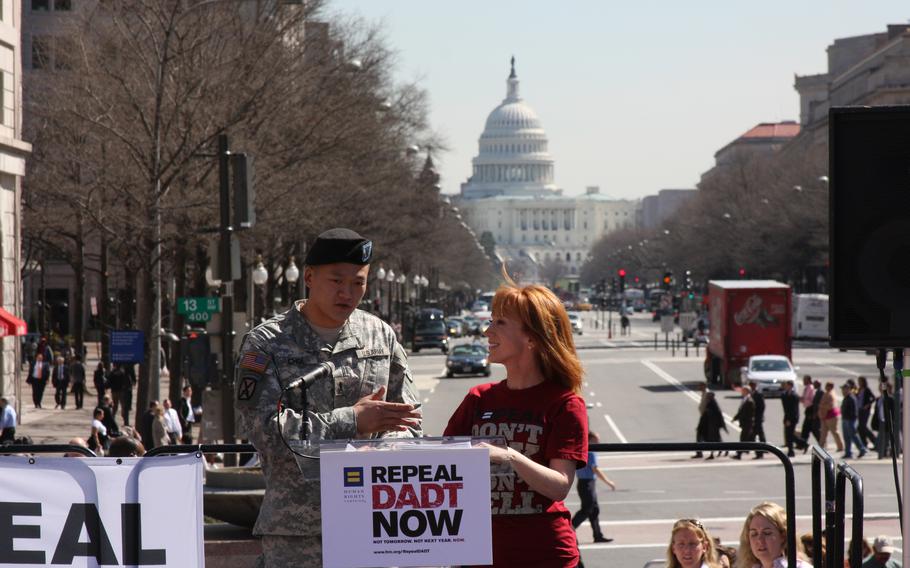
Comedienne Kathy Griffin and Army Lt. Dan Choi, an Arabic linguist kicked out of the service under the “don’t ask, don’t tell” law, speak at a Washington, D.C. rally Mar. 18, 2010, to repeal the military’s ban on openly gay servicemembers. (Leo Shane III/Stars and Stripes)
This article first appeared in the Stars and Stripes Europe edition, Sep. 21, 2011. It is republished unedited in its original form.
NAPLES, Italy — Jeremy Johnson didn’t want to get out of the Navy in 2007. He was a petty officer first class with a shot at making chief. But he also didn’t want to live a lie.
After dealing with what he called a hostile command environment, Johnson, 34, told his commander in a letter that he was gay, and he was discharged under “don’t ask, don’t tell.”
Johnson is one of an unknown number of gay troops discharged under DADT who will seek to reenlist now that the policy ended Tuesday. It’s unclear whether there will be room for those men and women in an environment of full recruitment quotas, troop drawdowns in Iraq and Afghanistan and a concerted effort to cut defense spending.
Recruiting has been robust recently. Each branch of the military, active duty and Reserve, has met or exceeded its recruiting goals so far this year.
“Recruiting is as good as it’s ever been,” said Tom Goering, a retired Navy recruiter who now runs the blog navycs.com. “There’s just no seats available.”
With unemployment nationwide stubbornly lingering near 10 percent, “the economy’s not helping,” he said.
Johnson was a mass communication specialist before being discharged in 2007. He sought help from U.S. Rep. John Sarbanes, D-Md., this year to find out from the Navy how he could re-enlist and do his old job once the DADT repeal took effect.
According to a March letter to the lawmaker from Navy Recruiting Command — provided to Stars and Stripes by Johnson — Johnson’s mass communication specialist rating is currently overmanned at 104 percent. So Johnson will be unable to re-enter the Navy doing his old job.
“If (Johnson) still desires reaccession in the Navy, he should begin reviewing other rates available that are of interest to him,” the letter states. “Due to recent successes in retention, decreased attrition, and planned reductions in end strength, vacancies in the United States Navy are very limited.”
Re-enlistment options for any Navy veteran discharged under eligible categories “are based on the needs of the Navy,” Navy Recruiting Command spokesman Jeffrey Nichols said in an email.
“Prior service applicants are encouraged to consider other ratings in addition to the rating they held before leaving the Navy.
“The greatest needs are in the most challenging career fields such as nuclear power, Navy diver, air rescue swimmers, explosive ordnance disposal and Navy SEALs.”
While a sailor’s discharge paperwork would contain certain classifications if they were discharged for homosexuality, Nichols said it is unknown how many sailors were discharged under DADT and how many are now eligible to re-enlist or plan to re-enlist.
When he heard his old job was overmanned, Johnson said he considered other ratings, but some of them have an age limit that disqualified him.
“A lot of us have been handicapped by age,” he said. Sailors discharged under DADT will not receive preferential treatment if they attempt to get back into the Navy, Nichols said.
“Members separated under DADT who want to return to the military will be evaluated according to the same criteria and requirements applicable to all others seeking re-entry,” he said.
For now, Johnson is setting his sights on the Reserves as he gets ready to graduate from college in May.
After that, he said, he’s considering the officer route to get back into uniform and “into the rhythm again.”
When he came out in 2007, he didn’t think he’d ever have the chance to get back into the Navy. “It’s not like I was failing professionally,” Johnson said. “I never really wanted to leave.”
Want to read Stars and Stripes’ interviews with other artists in Europe and the Pacific? Subscribe to Stars and Stripes’ historic newspaper archive! We have digitized our 1948-1999 European and Pacific editions, as well as several of our WWII editions and made them available online through http://starsandstripes.newspaperarchive.com/